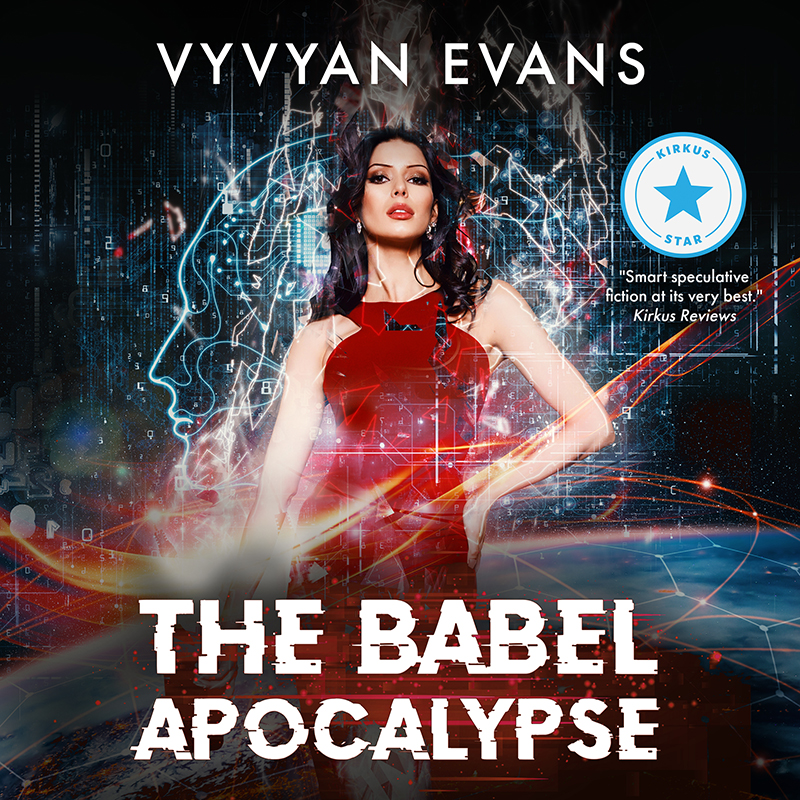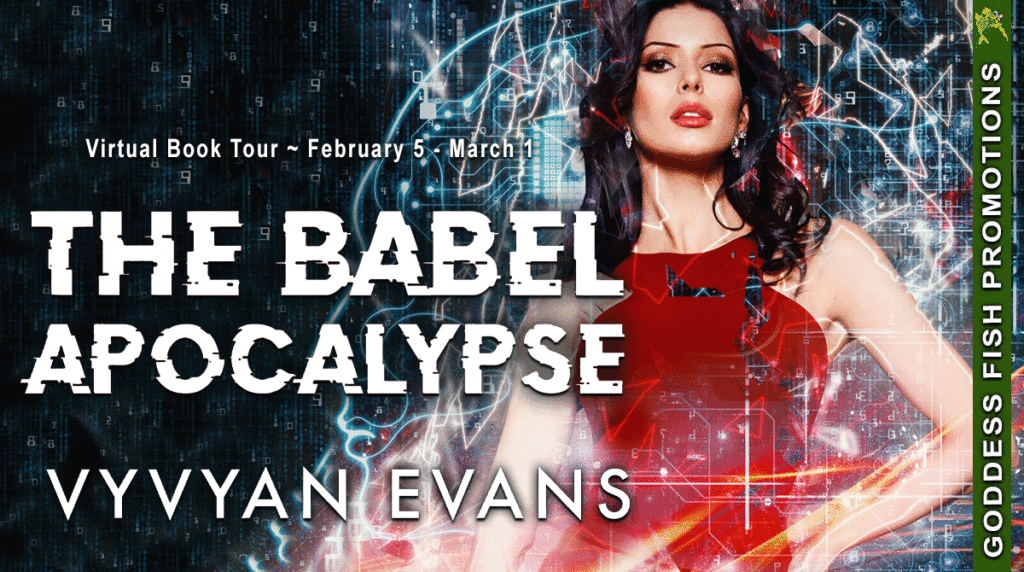Welcome to my stop on the virtual book tour for The Babel Apocalypse organized by Goddess Fish Promotions.
Author Vyvyan Evans will award a randomly drawn winner a copy of the audiobook. Don’t forget to enter!
And you can click on the tour banner to see the other stops on the tour.
The Babel Apocalypse
by Vyvyan Evans

Genre: Science Fiction
Synopsis
Language is no longer learned, but streamed to neural implants regulated by lang-laws. Those who can’t afford monthly language streaming services are feral, living on the fringes of society. Big tech corporations control language, the world’s most valuable commodity.
But when a massive cyberattack causes a global language outage, catastrophe looms.
Europol detective Emyr Morgan is assigned to the case. Suspect number one is Professor Ebba Black, the last native speaker of language in the automated world, and leader of the Babel cyberterrorist organization. But Emyr soon learns that in a world of corporate power, where those who control language control everything, all is not as it seems. After all, if the mysterious Ebba Black is to blame, why is the Russian Federation being framed for an outage it claims no responsibility for? And why is Ebba now a target for assassination?
As he and Ebba collide, Emyr faces an existential dilemma between loyalty and betrayal, when everything he once believed in is called into question. To prevent the imminent collapse of civilization and a deadly war between the great federations, he must figure out friend from foe—his life depends on it.
And with the odds stacked against him, he must find a way to stop the Babel Apocalypse.
~~~~~
Enjoy this peek inside:
As I was about to glance back at the voices, a light flickered in my peripheral vision, drawing my gaze upward to the night sky. A soft white glow, high up in the dark. At first it was indistinguishable from the airway lights. But it persisted, the size of a small disk at first, before shifting to red-orange, getting larger. At that point I realized it definitely couldn’t be a hover car. This was farther up, probably low Earth orbit, which explained the initial white. But the shift in coloration—that meant a detonation, producing nitrogen dioxide, which turned deep orange when mixed with air. A gaseous cloud has reached the atmosphere, I thought. I was witnessing a chemical explosion in space large enough to be visible to the naked eye. But what was exploding?
As I continued looking up, the orange grew in intensity until it flared across the skyline, illuminating the entire landscape around me with an eerie red-orange. It was only then that I became aware of the newly hushed silence of the drunken revelers nearby. And the silhouettes of other people too, who had also stopped and peppered the pedestrian corridor. We were all now strange red creatures, watching transfixed in rapt silence as the night sky was on fire. And just as suddenly as it had appeared, it was gone; the orange light faded back into a deep well of pitch black.
~~~~~
Guest Post From Author Vyvyan Evans:
Why you chose language as the focus for your story
My background is in linguistics, working as a university professor. Hence, I had written and published a good number of non-fiction books before moving into science fiction. I published 14 non-fiction books, including technical books, textbooks for university students and popular science books on language and communication for lay readers.
The Babel Apocalypse is a natural extension of my entire career as a researcher in linguistics. It imagines a near-future in which language is no longer learned, it’s streamed to neural implants in people’s heads from internet in space. But when a global language strikes, catastrophe ensues. The book explores how language works, and when it doesn’t what we all lose. I hope it makes the reader think about language in a whole new way.
The Babel Apocalypse imagines a future in which we stream language directly to neural implants in our heads, just as, today, we stream anything from movies, to books, to music, to our ‘smart’ devices, and consume that content. Smart devices use streaming signals—data encoded in IP data packets—encoded and distributed via wi-fi internet. Language streaming would work, in principle, in the same way. With a ‘language chip’ implanted in our brains, we will be able to ‘stream’ language from internet-in-space on demand, 24/7.
Moreover, based on an individual’s level of subscription to a language streaming provider, they would be able to stream any language they chose, with any level of lexical complexity. This means that someone could, potentially, apply for a job in any country in the world, without needing to be concerned about knowing the local language. Rather, the individual would just draw upon the words and grammar they need, to function in the language, by syncing to a language database, stored on a server in space. And call it up, over the internet, in real time, as they think and talk. It means that everything someone needs to know, to be able to use a language, is streamed over the internet, rather than being stored in someone’s head. Language learning, thus, becomes obsolete.
Science fiction has a long and illustrious habit of predicting the future. In 1940, with his first in the Robot series of stories, Isaac Asimov predicted some of the ethical issues that would arise as artificial intelligence comes to have a more pervasive influence in our daily lives.
Today in the twentieth first century, we are on the brink of a Fourth Industrial Revolution, sometimes dubbed 4IR. This is where automation and connectivity, via the internet, will dramatically alter the way in which we interact with each other, as well as everything around us, in our increasingly joined-up technological environment. And I predict, in less than one hundred years from now, this new technology will transform many aspects of our daily lives that we currently take for granted, including language itself.
As humans “give up” on language, and offload language learning, allowing AI to take over, language becomes a commodity (like any other, such as movies, music, etc., that we now stream on demand for a fee). In short, language would become a proprietary product, controlled for and by big tech, in service of shareholders and corporate interests.
Such a development leads to a slippery slope of issues ranging from potential censorship, to control of thought, and even, through cyberterrorism, the prospect of an existential crisis for the human race. The latter is manifested in The Babel Apocalypse most notably by a global language outage, which prevents large numbers of people from being able to communicate.
Self-evidently, in a world where most people have undergone language chipping, this would soon lead to a situation in which in the automated world there are no native speakers of language left. And with an entire population entirely dependent on language, were that language streaming ecosystem to fail, then the consequences would be catastrophic.
The Babel Apocalypse imagines a situation in which a cyberterrorist attack on language streaming servers in low-Earth orbit leads to just such a global language outage. Such an event, with its low probability, would be one for which humans would be completely unprepared. In The Babel Apocalypse, entire populations of people, literally at a stroke, lose the ability to use language, becoming feral. And hence, the consequences for civilization become catastrophic.
Hence, the concerns alluded to in the book relate, ultimately, to what it means to be human; and whether implantable AI can and should be allowed to replace previously fundamental aspects of the human experience. Moreover, these concerns highlight the abuse that arises from the commoditization of what we (may have previously) assumed to be a human birth-right, namely language.
~~~~~
About Author Vyvyan Evans

Dr. Vyvyan Evans is a native of Chester, England. He holds a PhD in linguistics from Georgetown University, Washington, D.C., and is a Professor of Linguistics. He has published numerous acclaimed popular science and technical books on language and linguistics. His popular science essays and articles have appeared in numerous venues including ‘The Guardian’, ‘Psychology Today’, ‘New York Post’, ‘New Scientist’, ‘Newsweek’ and ‘The New Republic’. His award-winning writing focuses, in one way or another, on the nature of language and mind, the impact of technology on language, and the future of communication. His science fiction work explores the status of language and digital communication technology as potential weapons of mass destruction.
Author Links: Book Website / Author Website / YouTube / Twitter / Facebook / Instagram
~~~~~
~~~~~
Thanks so much for visiting fuonlyknew and Good Luck!
For a list of my reviews go HERE.
For a list of free eBooks updated daily go HERE
To see all of my giveaways go HERE.












Thank you so much for featuring today’s book and author.
I like the book details.